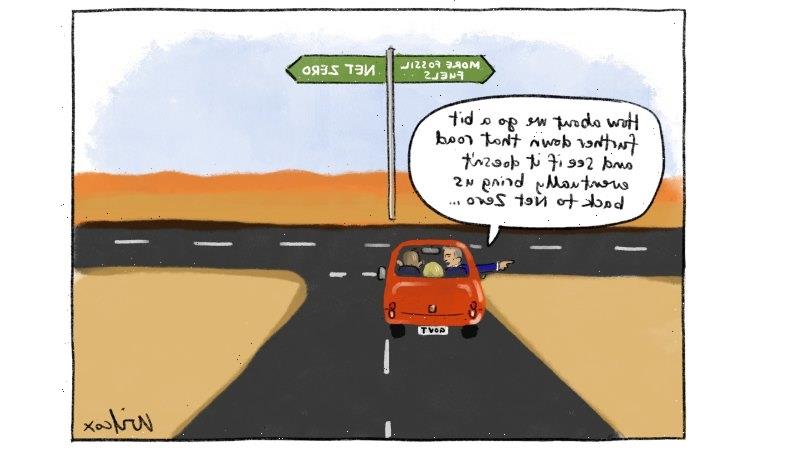
Loss of parks compounds this project’s problems
July 4, 2022Illustration: Cathy WilcoxCredit:
To submit a letter to The Age, email [email protected]. Please include your home address and telephone number. No attachments, please include your letter in the body of the email.
SUBURBAN RAIL LOOP
Loss of parks compounds this project’s problems
The lack of connectivity between stations is just one example of poor planning for the Suburban Rail Loop (“Mayors call for rail loop rethink”, The Age, 4/7). Even worse is the decision to take 36 hectares of the proposed regional Chain of Parks for the rail stabling/maintenance/repair yard in the Green Wedge at Heatherton when there is appropriately zoned industrial land nearby at Moorabbin, closer to the start of the line.
The Moorabbin route is two kilometres shorter (saving an estimated $2b) and avoids tunnelling close to the old, unlined, leaking putrescible landfills on the Heatherton route.
Has the government forgotten the extra years and billion-dollar cost of disposing of contaminated soil from the West Gate Tunnel?
The SRL authority is also taking half of the Sir William Fry Reserve parkland in Cheltenham, not for the station, which is underground, but to sell off for high-rise development to help pay for the SRL – not to mention other parkland along the line.
This project shows all the signs of having undertaken no rigorous assessment of costs, benefits, site locations and their alternatives. Let’s hope greater news coverage brings greater scrutiny.
Silvana Anthony, Heatherton
Why persist with this project?
Victoria’s debt projections now exceed $160 billion, so why persist with the Suburban Rail Loop? A few billion might instead purchase hundreds of electric buses and free public transport for a decade. There are a couple of very long north/south roads in that area that could be restricted to quiet and cleaner EV buses running along tree-lined boulevards shared only with local traffic and bicycles.
Successive governments have spread suburbia between Frankston and Stony Point, yet failed to electrify and duplicate the railway, let alone reinstate our Mornington line or create an airport connection.
Oh for some independents who will turn the Victorian state election into a referendum on the SRL project. It reeks of “value capture” property speculation, not public transport.
Ronald Elliott, Sandringham
A proper public consultation process is in order
Further to the councils’ comments on the distance between SRL stations and existing stations, the same applies for the proposed stations at university campuses. A key advantage of underground rail is stations can be positioned directly under the activity hubs or interconnecting stations, minimising the transfer walking time. For example, most airport rail services have a station directly under the airport terminal.
The selection process for the positioning of many of the preferred stations would appear to have ignored this key benefit of underground rail. At Monash University the station is outside the campus area requiring a 10-minute walk in the elements to the centre of the campus, and at Burwood the station is on the wrong side of Burwood Highway and at a substantial distance from Deakin University.
Other stations are less than optimally placed. The location of these stations would appear to have been selected by people other than transport experts with insufficient consideration for the convenience of the travelling public. This type of thinking will compromise the purpose and economics of the SRL.
A proper public consultation process and an independent review of the design are required in order to achieve the best outcome.
John Bell, Ashwood
Lack of new connections is a fundamental flaw
The proposed Suburban Rail Loop with an initial cost of $34.5 billion is fundamentally flawed: the route fails to deliver new connections for those living near its path (with a couple of exceptions). The section between Cheltenham and Clayton should have four new stations to enable locals to access rail connections in both directions. Ditto for other sections of the line.
Those familiar with the London Tube and Paris Metro understand the need to expand access to public transport rather than (essentially) joining existing stations. The SRL is a white elephant – and an expensive one at that.
Glenn Marchant, Pascoe Vale
THE FORUM
Make masks mandatory
I must support your correspondent’s frustration at people’s reluctance to wear masks unless compelled to do so by government or organisations (“Politicians must live in a parallel universe”, Letters, 4/7).
I’m triple vaccinated and reasonably fit for my age, but I have just spent a very miserable week in bed with COVID. Predictions are that cases will increase over the next few months.
COVID is not merely a sniffle for most people. If the simple act of wearing a mask could arrest spiralling case numbers it seems reasonable that the government should reintroduce mask mandates.
Graeme Lechte, Brunswick West
Is it all too hard?
Your reporter notes that published pandemic health advice includes “Despite high community transmission, Victoria is increasingly moving towards individual and community-led management of COVID” (“Thousands of Australians with COVID are dying, and it will get worse. Are we OK with that?”, The Sunday Age, 3/7).
So we are moving to relying on individual and community-led responses. Really? Name one pandemic or other public health crisis, with 2000 Victorian deaths in six months, solved without strong, ongoing state or Commonwealth government leadership.
How far does my individual leadership extend? I recently asked an unmasked person, taking the seat next to me on a tram, would they please wear a mask. That went down well. And which community are we to be led by? The family up the road that used to organise a street party on New Year’s Eve, the local anti-vax group or the local council, whose policies will undoubtedly be different from those of all adjoining councils?
Very distressing that an ongoing pandemic is too hard for our political leaders to handle.
Lloyd Shield, Moonee Ponds
Raising the standard
Let’s hope the Albanese government lives up to its animal welfare promises and encourages emerging technology in animal industries.
For many years, industry practice worldwide has been that male chicks, who cannot lay eggs and don’t grow fast enough for chicken meat, are thrown live into grinding machines as “waste product”.
Due to public pressure, this will soon be a thing of the past in France, Germany and Italy, who are using new technology to breed only female chicks. Just as our potential trading partners expect Australia to lift its climate targets before signing up, they will no doubt expect our farm animal welfare standards to match theirs.
Jan Kendall, Mount Martha
The key to sustainability
On reading Chris Barrie’s “The looming storm of food shocks” (Comment, 1/7) I went to the report Food Fight by the Australian Security Leaders Climate Group, of which he is a founding member.
It says: “By 2030, population growth and a burgeoning global middle class will result in a worldwide demand for 35 per cent more food and 50 per cent more energy, compared to 2014.” Water is critical to food production, yet more than 4 billion people will be living under serious water shortages by the mid-2030s. By 2050, the number of people facing acute water scarcity will have risen to 5 billion. Famine is almost inevitable.
We cannot stop people lifting themselves into the middle class, indeed it is welcome, but we can do something about population growth, both nationally and globally. We must ensure universal access to contraception for those who are sexually active, and achieve equality and education for women and girls. We must increase our foreign aid budget significantly with at least 4 per cent directed to family planning.
Currently, the world grows by 80 million people annually. If we can get that down to zero this decade, there is reduced likelihood of famine.
Jenny Goldie, Cooma, NSW
Things have changed
We are not being “Jeffed” again (Letters, 4/7). The situation is different.
Jeff Kennett sold off a lot of Victorian infrastructure before it became clear that such privatisations had very detrimental results for the community. Daniel Andrews is doing it in the full knowledge that it will be detrimental to Victorians.
So, we are being Danned, unfortunately.
Ken Courtis, Golden Square
The time is ripe for …
The expected fuel export boom most definitely should support the Australian population to transition to a greener future with the development of a sovereign wealth fund (“Fuel export boom spurs call to boost wealth fund”, The Age, 4/7).
This fund could support skills training to enable workers impacted by the decline of fossil fuel industries to transition into new jobs, and it could enable a quicker uptake of wind, solar and hydrogen infrastructure.
It should also be remembered that little or no tax is paid by the industries generating this windfall, and that this windfall was a matter of circumstance and not planning.
Denise Stevens, Healesville
… a sovereign wealth fund
If the federal government needs a reference manual in relation to boosting a wealth fund they really don’t need to go past Australian author Paul Cleary’s Trillion Dollar Baby: How Norway Beat the Oil Giants and Won a Lasting Fortune.
Key features included: a trustworthy and competent public service, a pushback to prevent politicians grabbing the money and spending (read “pork”), a world’s best practice to develop mineral resources including skilling their workers (some of whom will be involved in the Star of the South offshore developments), extracting the maximum possible share of profits and thus creating a fund for the benefit of the country.
Cleary devotes a chapter to comparing Norway’s and Australia’s approach to mineral development.
Norway? Foresight and determination for their greater good.
Paul Haarburger, Traralgon
Why the fuss?
Is it really such a big deal that there are clubs for men only like the Athenaeum Club (“Private club’s younger men say no to women”, The Age, 4/7)?
A quick internet search shows that there are a number of women only clubs in central Melbourne. What is the big deal with either of them? Much bigger fish to fry in the world I would have thought.
Phil Labrum, Flemington
It’s about more than price
Well done to the Victorian government for promoting the transition away from gas by ending incentives to residential gas products (“New Victorian homes gas-free”, The Sunday Age, 3/7).
While this move has been largely driven by rising gas prices and greenhouse gas concerns, the health implications of gas need to be reiterated. The use of gas for heating and indoor cooking carries many health risks; research from the Climate Council last year revealed that cooking with gas was estimated to be responsible for up to 12 per cent of childhood asthma in Australia.
If indoor pollution from gas is bad for our children and their growth, imagine what it is doing to our own lungs too.
Ching Ang, Magill, SA
Are we being punished?
One of outgoing planning minister Richard Wynne’s last acts was to approve the Mirvac development that will see towers up to 10 levels overlooking Princes Park despite opposition from council and residents (“Minister’s Mirvac move sparks anger”, The Age, 4/7).
Moreland Council has a well-considered plan to maintain the amenity of residents while supporting the development of old industrial and commercial plots. The innovative development is by companies that respect council plans. These developers adhere to council height regulations.
Why would the state government sabotage the efforts of a local council that is trying to turn around more than a century of environmental and civic impairment due to the concentration of industry.
The Labor Party lost its historically safe state seat of Brunswick to the Greens some years ago and I don’t see it winning it back any time soon. Are we being punished for voting Green?
Judith Miralles, Brunswick West
A more fitting tribute
It is fitting that the feisty and courageous Jane Garrett receives a state funeral, and I trust this will bring much comfort to her family, especially her children, who lost their mother way too soon.
However, a more appropriate tribute to her memory would be for the Andrews government to finally come clean on the mess it has made of Victoria’s emergency services. Specifically, the non release of the report on sexism and bullying in fire services she commissioned in 2015 (“New push to table report on bullying”, The Age, 4/7), as well as full transparency over Daniel Andrews’ hidden negotiations with union leader Peter Marshall. Or must we wait for IBAC to report?
We are just months away from a state election – and next bushfire season. We can only hope that the passion and dedication of our valiant volunteer fire forces have not been irreparably damaged by these political power wrangles. It’s high time to clear the air.
Caroline Leslie, Hawthorn
We must call this out
Osman Faruqi’s opinion piece totally misses the mark in his defence of Nick Kyrgios’ recent behaviour (“Kyrgios owes the public nothing for being himself”, The Age, 4/7).
He says that he believes Kyrgios is “entitled to play any way he wants and say whatever he wants as long as he continues to keep qualifying and winning”.
Unfortunately Nick’s antics are just another example of the type of boorish behaviour by over-indulged brats that we seem to find acceptable as long as they can kick a football or swat a tennis ball.
We absolutely need to call out this behaviour and hold all of us to higher standards if we have any hope of a kinder, more considerate world.
Julie Perry, Highton
Another case for plants
By highlighting the incredible amounts of electricity needed by dairy farmers to produce cows’ milk, National Farmers Federation President Fiona Simson is highlighting why plant-based milk might be a better use of resources (“Electricity prices matter to your morning coffee”, Comment, 4/7).
Charles Davis, Hawthorn
AND ANOTHER THING
Tennis players
We need more of Wimbledon 2021, when Ash Barty’s example brought out the best in people. Instead we have Wimbledon 2022, when Nick Kyrgios’ example seems to bring out the worst. Jenifer Nicholls, Armadale
Bravo, Osman Faruqi (“Kyrgios owes the public nothing for being himself”, The Age, 4/7) for speaking out against the media treatment of Nick Kyrgios.
Brian Kidd, Mount Waverley
What an enormous relief to read that Nick Kyrgios doesn’t owe me (among many others) anything. I have recently been concerned about not owing him anything; now I can rest easy knowing we’re basically square.
Barry Miller, Kyneton
Privatisation
Government businesses exist to provide for the social good of the community; private business exists purely to make a profit (“Free online tests for rookie drivers”, The Age, 2/7). Expect to ultimately pay more for VicRoads products.
David Eames-Mayer, Balwyn
The pandemic
Is this the state government’s Ossie Ostrich COVID strategy, i.e. stick your head in the ground and you’ll be OK?
Bernd Rieve, Brighton
Furthermore
The Athenaeum Club, Melbourne: Inside it’s 1870, outside, it’s 2022.
Ron Mather, Melbourne
Instead of being subjected to “sonic abuse” (“Hounded out of the ’G”, Letters 4/7) by expensive imported singers (“Money not well spent”, Letters, 4/7) why not consider going to another football match – VFL or AFLW.
John Walsh, Watsonia
If Australia really is a clever country, we could be riding on the back of green energy.
Joan Segrave, Healesville
Finally
You don’t even have to go to the United States to enjoy the thrill of time travel (Letters, 4/7). I woke up on the morning of May 22 and discovered Australia had moved forward 70 years with the removal of Scott Morrison.
Daniel Robinson, Parkdale
Gay Alcorn sends an exclusive newsletter to subscribers each week. Sign up to receive her Note from the Editor.
Most Viewed in National
From our partners
Source: Read Full Article



